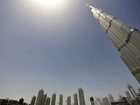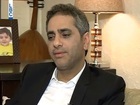The United Arab Emirates will expel 70 Lebanese nationals, mostly Shiites, within the next 24 hours, Foreign Minister Jebran Bassil said Friday.
"The ministry of foreign affairs was informed by the Lebanese embassy in the Emirates that 70 Lebanese will be deported by the authorities in the next 24 hours," Bassil told Agence France Presse.
 Full Story
Full Story
Lebanese Forces leader Samir Geagea stated on Friday that the situation of Christians in the region is “very difficult.”
He said via Twitter: “The Christians should stop their weeping and hold on to their land.”
 Full Story
Full Story
Naharnet and the United Nations Development Program (UNDP) Climate Change team are proud to announce the launch of a new partnership which aims at informing you about climate change, updating you on Lebanon’s efforts in combating it and keeping you posted on relevant international studies and events.
This partnership is being initiated in the wake of a very intensive climate year. 2015 will be a historic period during which countries will multiply their international discussions and national efforts to agree on how to reduce the impact of climate change.
 Full Story
Full Story
Progressive Socialist Party leader MP Walid Jumblat on Thursday urged the Druze Arabs in Israel to run in the upcoming legislative polls in “unified” lists with the aim of achieving “drastic change.”
“Once again I address this appeal to the Druze Arabs in occupied Palestine, who are suffering along with their Palestinian brothers from occupation, tyranny and injustice due to the practices of Israel, which is seeking to totally eradicate the Arab identity,” said Jumblat in a statement.
 Full Story
Full Story
Iran's top general said Wednesday his country has reached "a new chapter" towards its declared aim of exporting revolution, in reference to Tehran's growing regional influence, while hailing the role of Hizbullah in resisting Israel.
Major General Mohammad Ali Jafari, commander of the nation's powerful Revolutionary Guards Corps, said: “Hizbullah and its resistance against one of the armies in the world -- that is to say the army of the Zionist regime.. is one of the Islamic revolution's miracles," he said.
 Full Story
Full Story
Under the patronage of the Minister of Tourism, His Excellency Mr. Michel Pharaon, ihjoz, the first digital ticketing network in Lebanon, hosted a conference entitled: Ticketing in the Digital Age for Events and Tourism. The event was held at the Hilton Hotel on March 10, 2015, in the presence of partners, industry stakeholders and key members of the press.
Panelists at the ihjoz conference included His Excellency Mr. Michel Pharaon, Minister of Tourism, Mr. Khalil Daoud, CEO of LibanPost, Mrs. Randa Bdeir, Head of Electronic Banking at Bank Audi, Mr. Bassam Tueni, co-founder of ihjoz, and Sami Tueni, co-founder and CEO of ihjoz.
 Full Story
Full Story
Former singer turned Islamist militant Fadel Shaker has decided to turn himself in to security agencies in the coming days, his lawyer announced on Monday.
“Fadel wants to turn himself in in the coming days,” the lawyer May Khansa, who is defending him before the Military Court, told Agence France-Presse.
 Full Story
Full Story
Former pop star turned Islamic militant Fadel Shaker, who has been on the run for nearly two years, has said he wants to return to his "normal, natural life" with his friends and family.
In an interview with LBCI TV released Saturday, Shaker also denied fighting alongside the gunmen of Islamist cleric Ahmed al-Asir in the fierce 2013 clashes with the army in the Sidon suburb of Abra. At least 18 soldiers and dozens of gunmen were killed in the fighting.
 Full Story
Full Story
The military commander of al-Nusra Front in the Syrian province of Idlib was killed Thursday in an operation by the Syrian army, state-run news agency SANA said.
The agency said Abu Hammam al-Shami was slain during a military operation that targeted a Nusra meeting in the village of Habeet, in the northern Idlib province.
 Full Story
Full Story
The U.S. Treasury Department has said that it placed sanctions on an Africa-based Hizbullah support network.
Mustapha Fawaz, Fouzi Fawaz, and Abdallah Tahini were sanctioned for acting for or on behalf of Hizbullah in Nigeria, the Treasury said in a statement.
 Full Story
Full Story



